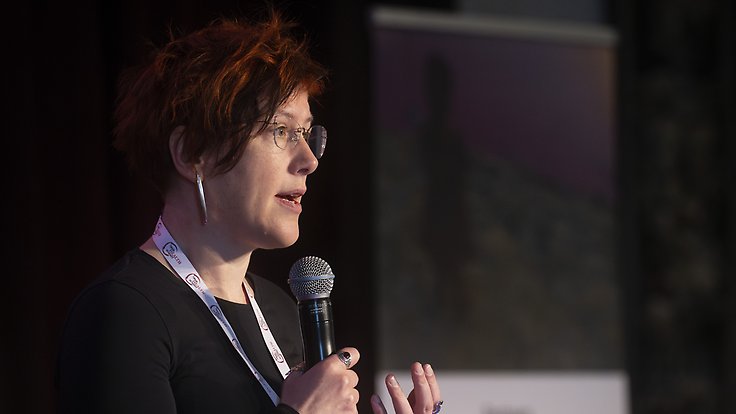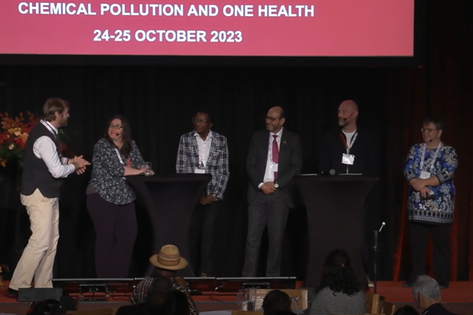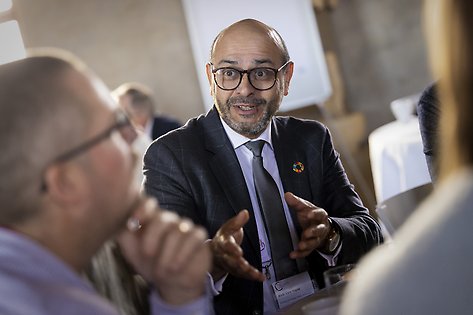Uppsala Health Summit 2023: "To act now requires leadership"

Professor Joëlle Ruegg, Uppsala University. Photo: Mikael Wallerstedt
The closing dialogue at Uppsala Health Summit 2023: Chemical Pollution and One Health highlighted key messages on a critical shift from reactivity to proactivity. Dr. Laura N. Vandenberg, Dr. Isaac Olufadewa, Ambassador Luis Vayas, John Tumpane, and Dr. Kateřina Šebková shared compelling perspectives on outreach, science-policy interfaces, and the vital role of leadership in driving change.
At the end of the 25th of October, an inspiring closing discussion was held at the Uppsala Health Summit 2023 in Uppsala castle on actionable insights into policy approaches and communication strategies for driving change, moderated by the Programme Committee Chair Professor Joëlle Rüegg, Uppsala University, and the moderator Robert Watt, Engagement Director at Stockholm Environment Institute. Participating speakers were:
- Dr. Laura N. Vandenberg, Professor and Research Scientist, University of Massachusetts Amherst, USA
- Dr. Isaac Olufadewa, Founder and Executive Director, Slum and Rural Health Initiative, Nigeria
- Luis Vayas, Ambassador, Ecuador, Vice President of the INC Bureau of the global legally binding instrument on plastic pollution
- John Tumpane, Head of the Department of Environment at Formas
- Dr Kateřina Šebková, Director, RECETOX, Faculty of Sciene, Masaryk University

From the left: Robert Watt, SEI (moderator), Dr. Laura N. Vandenberg, University of Massachusetts,Dr. Isaac Olufadewa, Slum and Rural Health Initiative Nigeria, Ambassador Luis Vayas, Ecuador, John Tumpane, Formas, Dr Kateřina Šebková, RECETOX, and Professor Joëlle Rüegg, Uppsala University, Chair of the UHS 2023 Programme Committee
What is the most important message, issue or point that was brought up during these two days that would really move us forward and move us from insights to action, from reactivity to proactivity?
My field is environmental health sciences and I study endocrine disrupting chemicals and for the last 15 years I have had to argue with people that this problem is real. The conference days have proven that we are in consensus that the problem has changed, we are ready to think about solutions”, says Dr. Laura N. Vandenberg, Professor and Research Scientist at University of Massachusetts Amherst.
According to Dr. Isaac Olufadewa, Founder and Executive Director of the Slum and Rural Health Initiative in Nigeria, the word that should stick to all of our minds is the word Outreach
.
When I say outreach, I mean that we need to see how to get into the solutions, and we need researchers who are having the evidence to take this work to policymakers, and we need researchers to be able to incorporate these into the curriculum of future clinicians. We need outreach to the public to be more aware about these issues and ensure that the research, policy and program implementation is carried out as efficiently as possible”, says Dr. Isaac Olufadewa.

Ambassador Luis Vayas, Ecuador, Vice President of the INC Bureau of the global legally binding instrument on plastic pollution Photo: Mikael Wallerstedt
Ambassador Luis Vayas, Ecuador, Vice President of the INC Bureau of the global legally binding instrument on plastic pollution, stresses that from his point of view as a negotiator, as a representative of a country that is in multilateral environmental negotiations, the solution is about science-policy interface
.
I have reaffirmed what I’ve already believed in but during these two days and answering your question how we pass from being reactive to proactive I think that the ‘science policy interface’ is the solution. I believe the relation between the scientific community and policymakers has to be formal, and it has to be institutionalized. I wish what I have experienced these two days that my colleagues from other countries, my colleagues from Ecuador will have the same opportunity so that’s what we do and that’s what we should keep doing, this relation between scientific community and policy and decision makers but I think we need to do it also in a formal way”, says Ambassador Luis Vayas.
“To act now requires leadership”
To act now requires leadership, and looking out at the room, you can see that the research community really are showing leadership on this issue. Although there are some diplomats and politicians who are showing leadership on the issue as well, we may need to see more political leadership, but I would like to see more leadership from the business community. I believe that there are some sectors and businesses that could actually show genuine leadership on this issue and then I think we need to have a conversation about how to build coalitions of the willing where it’s not just researchers who are driving the issue but that we have researchers and policymakers and businesses together driving the issue and that when we talk about science policy we can also talk about maybe the science decision maker interface where businesses also need to make decisions about what risk they’re taking and what future they imagine for themselves and for the world. So, I think leadership will be my word for today”, says John Tumpane, Head of the Department of Environment at Formas.
“It can actually be an incremental change into making things happen”
When I came here to this meeting, my goal was, among other things, to witness the great work undertaken by the scientific community in integrating existing knowledge into the scientific field. This is particularly important during the negotiations of the Plastic Treaty and I believe it would be really worthwhile that more scientists would mobilize themselves. Although it doesn’t mean new research papers or more research funding for their work it actually can be an incremental change into making things happen, not only trying to expand our knowledge but really teach practitioners on the ground what it means to do the risk management and why they actually should focus on certain limit values", says Dr Kateřina Šebková, Director, RECETOX, Faculty of Science, Masaryk University.
Partnership and collaboration
Dr Kateřina Šebková stresses that there are things which countries cannot do alone and the partnership and collaboration are extremely needed in this field, and we have now the instruments
.
You shouldn’t use plastic containers that were filled with chemicals for something else because it’s really harmful to you and some people have learned the tough lesson and paid for their life with it, and that doesn’t happen that much anymore but it still happens, and the role of the scientist is to bring new knowledge and put it forward, and the role of decision-makers is to listen and pick it up and make it happen because the decision makers are responsible for the well-being of their communities, of their people, in their own countries, but there are things like chemicals who do not respect borders”, says Dr. Sebková.
There is change in the world
People start recognizing that the issue of climate change, biodiversity and pollution caused by chemicals and that it is as important as the other two. The change is not quick enough in the chemical world, but we are getting there, so I do advocate for you. Please be open-minded and look for the opportunity; it is there, and it will come, and we will be more proactive”, says Dr Šebková.
How do we close the loop between the research and the policy to actually make that faster?
By understanding how it works by getting involved in your National Delegations. When we speak about chemicals and regulation of chemicals, we need scientists, we need people who understand the technology, who have the knowledge behind it and not only those who put it into legal words”, says Dr Šebková.
Who, in addition to scientists, should act now?
I think the medical community is an untapped opportunity. Most people see a physician hopefully once a year, and we in the endocrine society have been working very hard to get education to medical professionals about the effects of environmental pollution. What we hear from clinicians is they don’t like being asked questions they don’t know the answers to, so when their patients are asking them questions about how to avoid PFAS for instance, they don’t readily have an answer. We have to start to work with the medical community and use them as the wedge that they can be for good. The medical community was essential in interventions focused on domestic violence, guns in the home, tobacco smoke, so I think that’s low-hanging fruit as far as I’m concerned”, says Laura N. Vandenberg.
Watch the closing panel discussion from Uppsala Health Summit 2023:
In March 2022, at the fifth session of the UN Environment Assembly (UNEA-5.2) 175 nations agreed to develop a legally binding agreement to end plastic pollution by 2040, which the UNEA has resolved to put forward by the end of 2023. In November 2023, governments meet in Nairobi for the third round of negotiations for the treaty. Read more about the Global Plastics Treaty on UNEPs website. One of the workshops at the Uppsala Health Summit 2023, "A Global Plastics Treaty - and Beyond" discussed how legal instruments most effectively can contribute to eliminating pollution from plastics and chemicals at large. Learn more about the workshop in our preconference report and stay tuned to read about the results in our post-conference compendium of briefs.
